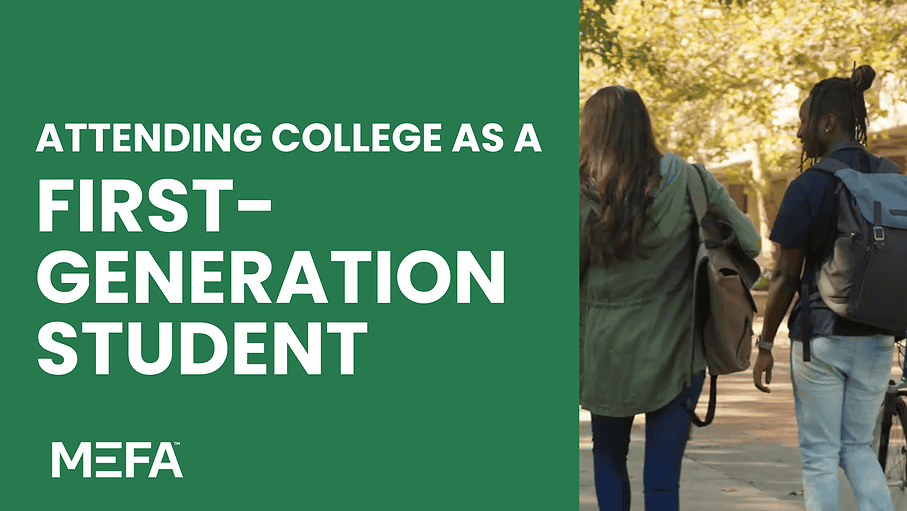Two first-generation college graduates share their experiences with college, what they are most proud of, and their advice to other first-generation students.
Please note that this transcript was auto-generated. We apologize for any minor errors in spelling or grammar.
For my parents, education was really important to them or for us to get a very good education. So school was always a very serious, serious thing, being a good student and all those things. They’re immigrants, and so they didn’t go to college. They wanted me and my sisters to just have a better opportunities.
And the way that they saw better opportunity was college. It was definitely the main reason that came to the United States. In my family, college wasn’t really a goal. It wasn’t something that was pushed, promoted. My parents were happy that I was going to go to college, but I was the youngest of eight kids between my dad and my step mom and, you know, the blended household.
And I was the first one out of eight to graduate from college, but in my family, it was really more about hard work. That was what my parents pushed and promoted.
This whole notion of college as an experience, above and beyond classes was something very foreign to my family. So we didn’t, you know, they didn’t really understand that college was more than just classes. You know, that it was, it was definitely an experience. Living in the dorms, being part of clubs, being, you know, really on your own in some ways.
And trying to navigate the day and manage time and all those things. I do remember in high school there was a financial aid night at my high school. And many years later at MEFA, I went on to do the financial aid night at my high school, which is kind of funny. I do remember sitting at the kitchen table with my dad and reading the questions of the FAFSA, and he’s looking at his taxes and helping me fill it out.
And then when I ended up at community college, I showed up in the financial aid office the day of and they helped me and I got through a year there, which was great. Then I transferred to a four-year state college and it was far from home. So I ended up transferring, and having to get a job in the summer.
And then when I got to school every semester, it was just too much. I needed to have a part-time job year round. I needed that stability because I was paying for school on my own. So I ended up transferring to Bridgewater State university and did my junior and senior year there and graduated.
I played rugby there, and it was a great experience. And the financial aid office at Bridgewater was excellent. You know, when I wanted to move on campus, they were able to help me secure additional loan funding to pay for it on my own, because that was, you know, an extra expense.
What I’m most proud of? It’s not just graduating, it’s navigating the whole process on my own. That’s what I’m most proud of and not having been entirely intimidated. Although I remember there were times where I felt really lonely, like, how do I do this? I don’t know who to talk to. Everyone seems to know what they’re doing or they’ve got some guidance, but I just didn’t have any, I didn’t have anyone paving the way before me.
I did have conversations with my guidance counselor, I remember I went to Wachusett Regional High School and I remember my counselor identifying a couple of schools. I really took advantage of the clubs and things like that. And then I also loved the library. That was one of my favorite places to go.
I was at a high school that had a high college-going rate. I played a lot of sports. I was a good athlete. I was very involved. I was class vice president in student government, things like that. So, I had a lot of drive in that regard. My goal to go to college was really… my goal. It wasn’t anybody else’s goal from applying to college to graduation.
I was the driver. I paid for every penny. I did all the work, all the applications. So I am proud that I was able to put myself through college, graduate and, you know, go on to graduate school many years later. When I hear other stories of folks who might have had a different route to college, it really does stand out as something that I, I drove the bus on my own.
Continue to be a curious learner, continue to take advantage of everything that’s in front of them, to acknowledge that it’s hard. Well, I would also say too, that there’s a lot of help out there. Like there are a lot of people and resources, all these offices at college campuses, guidance counselors.
It’s just a matter of asking questions. There’s so much opportunity. Take advantage of the opportunities. Yeah. My advice would be to be persistent, to just accept the fact that you may have to do a little bit more. Some, with some students who are first-gen, they might not have as much family support as far as getting through the process.
I think most students have emotional support and love from their parents, but If their parents didn’t go to college, they might not have the education and the background to be able to assist them in what they need to do to go to college. So, taking advantage of other means of support. I remember when I was in high school, my boyfriend at the time, his mom helped me with my essay.
Cause she was a college graduate and a professional and so she helped me. So you just have to find people who will help you and take advantage of that. If they offer, then take advantage of it. It doesn’t have to come within your own family. Work with your guidance counselor, you know, work with parents of friends that might have gone to college and are familiar with the process.
Work with free resources at your school, things like that, but, but don’t get discouraged that you might have to do a little bit more.













